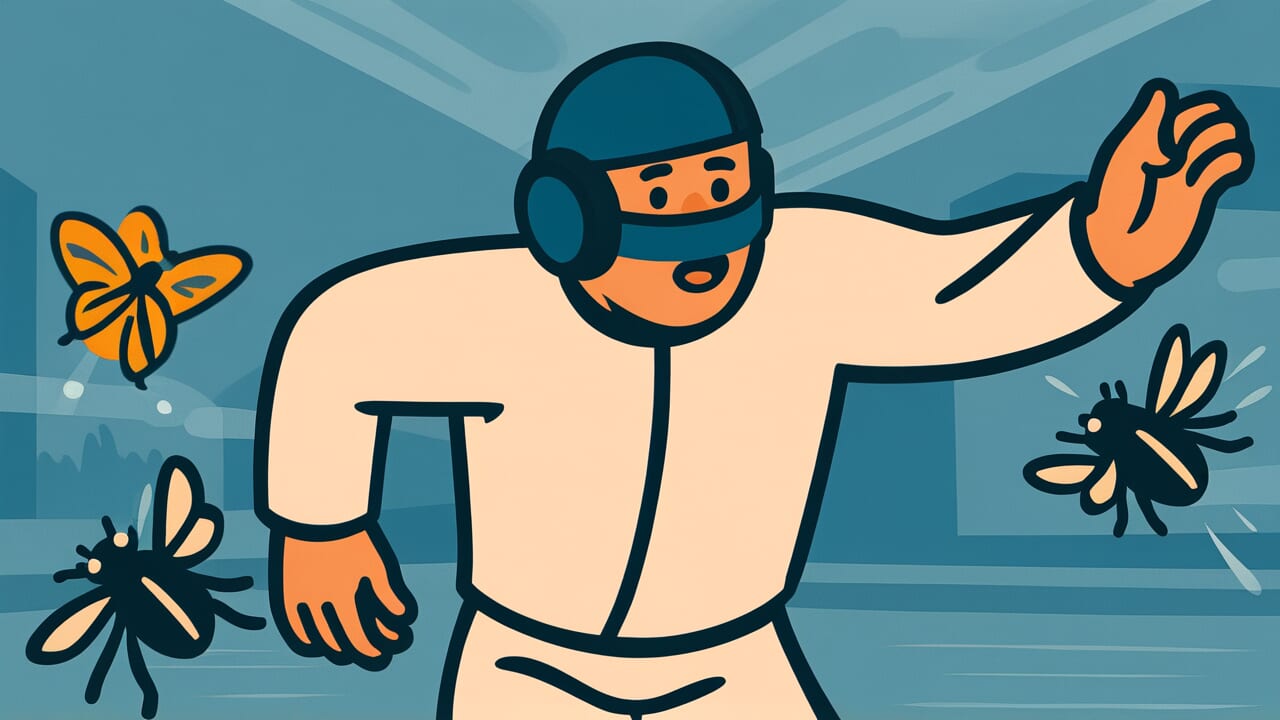How to Read “Chase the fly above your head”
Atama no ue no hae wo oe
Meaning of “Chase the fly above your head”
“Chase the fly above your head” is a warning that tells you to solve your own problems first before meddling in other people’s affairs.
This proverb is used for people who ignore their own problems while constantly pointing out others’ flaws and mistakes.
They don’t notice the fly buzzing above their own head. In other words, they ignore the troublesome issues in their own life while obsessing over other people’s problems.
This proverb sharply points out this human tendency.
We still see this situation everywhere today. At work, at home, at school.
Someone with a messy room criticizes others’ organization. Someone behind on their own work complains about how colleagues do things.
This proverb serves as a warning against such contradictory attitudes.
Looking at ourselves objectively is the hardest thing for humans to do.
That’s why this proverb lives on as a universal lesson: “Reflect on yourself first.”
Origin and Etymology
The exact origin of this proverb isn’t clearly documented in historical texts. However, we can make interesting observations from how the phrase is constructed.
Let’s focus on the expression “the fly above your head.”
Flies are familiar creatures that everyone finds annoying. A fly buzzing above your head is especially bothersome because it enters your field of vision.
This symbolizes your own problems and the troubles in your immediate surroundings.
Humans have a strange quality, though. We don’t notice the fly above our own head, or we ignore it even when we do notice.
Yet we react sensitively to other people’s problems. The cleverness of this proverb lies in expressing this psychological tendency through a familiar insect.
“Chase” in command form is also important. This isn’t just advice but a strong warning.
It functions as a sharp and accurate criticism of people who criticize others while ignoring their own faults.
This expression likely emerged from everyday Japanese life. It probably arose to avoid friction in relationships and encourage self-reflection.
Despite being a simple metaphor, it sharply captures human nature. It’s a proverb packed with practical wisdom from daily life.
Usage Examples
- He’s always late but complains about others’ time management. It’s truly a case of “chase the fly above your head.”
- Before criticizing others on social media, I remind myself to “chase the fly above your head.”
Universal Wisdom
“Chase the fly above your head” reveals a fundamental distortion in human perception.
Why do we see other people’s problems more clearly than our own?
This is a psychologically explainable phenomenon. Acknowledging our own flaws causes pain that hurts our self-esteem.
On the other hand, pointing out others’ flaws gives us the illusion of elevating our own position.
Criticizing others is a defense mechanism that helps us look away from our own imperfections.
Thinking more deeply, this proverb touches on the essence of human relationships.
To maintain harmony in a community, each person must first fulfill their own responsibilities.
If everyone only points out others’ problems, society fills with criticism and conflict.
Our ancestors understood this human nature. That’s why they used the familiar fly to issue a warning everyone could understand.
The difficulty of self-reflection and its importance. This proverb conveys both truths concisely.
As long as humans remain imperfect, this wisdom never fades. In fact, its value may be growing in our modern age.
Information overflows and we can easily see into others’ lives. Perhaps that’s why this teaching matters more than ever.
When AI Hears This
The amount of attention the human brain can process simultaneously is surprisingly limited.
Cognitive psychology calls this “attention bandwidth.” The fly above your head is fascinating because it has extreme asymmetry.
It costs one second to solve but infinite cost to ignore.
For example, swatting away a fly takes one second. But if you leave it, your brain keeps sending “this is annoying” signals during meetings and study sessions.
It’s like a background app on your phone. It has nothing to do with your main task, yet it constantly drains processing power.
Behavioral economist Daniel Kahneman compared human attention to a “psychological wallet.”
This wallet has limited contents. Just one small worry reduces the attention resources you could have used.
What’s more troublesome is our habit of thinking small problems are “okay to postpone.”
But the brain’s memory gets loaded not by problem size but by whether it’s unresolved.
A billion-dollar debt and a fly above your head both cost the same cognitive resources as long as they remain unsolved.
This proverb shows the most efficient investment strategy in the economics of attention resources.
The principle is: “For small problems you can solve instantly, move your hands before thinking.”
Lessons for Today
This proverb teaches you the courage to pause before criticizing.
Open social media and someone’s opinion or action catches your eye. You want to say something.
At work, a colleague’s performance bothers you. At home, family behavior irritates you.
In those moments, remember this proverb.
Ask yourself, “Wait, what about me?” Turn that critical arrow slightly toward yourself.
You don’t need to be perfect. Just have the humility to admit you also have room for improvement.
That alone gives your words more weight. Your relationships will change remarkably.
Facing your own problems is never easy. But that’s where real growth begins.
You can’t change others, but you can change yourself. The moment you make that choice, you transform from critic to practitioner.
Chase the fly above your own head first. That attitude becomes the most persuasive message to those around you.
Show through actions, not words. That’s the way of life this proverb teaches.



Comments